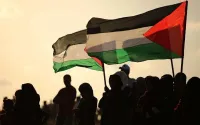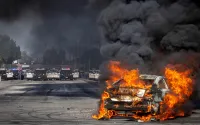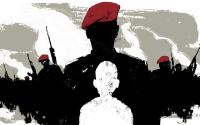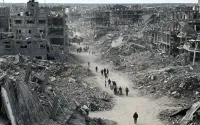The Independent12 February 2004As Iraq reeled beneath savage and almost daily suicide bombings, US forces yesterday doubled the reward - from $5 million to $10 million - for the capture of Musab Zarqawi, an obscure and little-known associate of Osama bin Laden whom they claim is trying to provoke a civil war in Iraq.Zarqawi, who is indeed inside Iraq, is trying to organise further bombing attacks on US troops and US-paid Iraqi police forces by using exclusively Iraqi Sunni Muslim insurgents. But, despite what Washington would like the world to believe, he has no senior leadership position in al-Qa'ida.Although a letter that the Americans claim to have found in Iraq in which Zarqawi - real name Ahmed Fadil al-Khalaylah - allegedly calls for attacks against Iraq's majority Shia Muslim population, impeccably reliable sources close to al-Qa'ida say that bin Laden's organisation wants to concentrate on the occupiers, their "collaborators'' and foreigners in Iraq, not members of other Muslim communities.America's new focus on Zarqawi came as a suicide car bomb killed 47 people at an army recruitment centre in Baghdad. Within 24 hours the death toll of Iraqis working with the US occupation forces has reached 100.The new police and new army recruits are vital to Washington's plan to hand back power to Iraqis by 30 June. The suicide bomber came well-prepared, carrying a bomb with 300 to 500 pounds of plastic explosives mixed with artillery shells - to maximise the "kill effect" according to US Colonel Ralph Baker at the scene.Ghassan Samir, one of the wounded, said: "We were standing in line waiting to start our shift in the new army and we saw a white car drive by us and then blow up. Many died. There were about 400 people in line." There was no claim of responsibility. As the US focused on Zarqawi, the sources revealed to The Independent that he was with bin Laden in Afghanistan in 2001 and that he participated in the final battles at Tora Bora, where he was slightly wounded . He has moved in and out of Iraq frequently since last summer, the sources claimed, and in August managed to cross into Jordan to visit his wife and children who live in the city of Zarqa. A blunder by Jordanian secret police allowed him to spend at least one night with his family before crossing back into Iraq.Zarqawi is - as the Americans claimed - associated with the Ansar al-Islam movement in northern Iraq, just as the US Secretary of State, Colin Powell, stated in his 5 February 2003 address to the UN Security Council, but America's claims that "foreign terrorists'' are behind the bloody attacks in Iraq - and that Zarqawi's presence there is proof of this - are way off the mark. Almost all the suicide bombers to have immolated themselves in the country are Iraqis. Zarqawi himself, though a Jordanian national, is from the Bani Hassan tribe which exists in Iraq as well as Jordan. For most Arabs, whose national borders were drawn by the British and French after the First World War, tribe is more important than country. To all intents and purposes Zarqawi is an Iraqi.At a time when they can find neither Bin Laden nor the Taliban's Mullah Omar, the American effort to promote Zarqawi as a "top-tier terrorist'' may well be an attempt to set up a wanted man who will be easier to find and arrest, or kill, than the other two. US forces say he has been involved in "terrorist plots'' in France, Jordan, Germany and Israel - along with those who set off four bombs targeting a Jewish synagogue and British consulate in Istanbul - although the al- Qa'ida sources scoff at this list. He has been accused of planning the murder of an American diplomat in Oman and associated with an alleged attempt to use the poison ricin in the London Tube. In fact, it is far more likely that Zarqawi was involved in last year's attack on the Jordanian embassy in Baghdad.But any analysis of Zarqawi's case has to take into account President Bush's election campaign. Having found no weapons of mass destruction in Iraq and unable to crush the growing resistance movement to US occupation and faced with a steady haemorrhage of American blood in Iraq, Mr Bush badly needs to prove that the Saddam regime was involved with al-Qa'ida and thus with the international crimes against humanity of September 11, 2001. Hence the real importance of Zarqawi. Alas for Mr Bush, Zarqawi was in Afghanistan - not Iraq - in 2001.Iraqis already had a tradition of suicide bombing; two Iraqi women blew themselves up next to a US checkpoint during last year's invasion and an Iraqi policeman drove a car bomb into US troops a few days earlier. Suicide is not an exclusive tactic of al-Qa'ida, however much the organisation and President Bush might like the world to believe that.
America sets its sights on a new Public Enemy No 1
Canlı Yayın
Kâinatın tüm seslerine, renklerine, titreşimlerine Açık Radyo...
Ekolojiden siyasete, edebiyattan müziğe Apaçık Radyo'da haftanın öne çıkan gündemleri mail kutunuzda!
İletişim
Açık Medya Yayıncılık A.Ş.
Koltukçular Çıkmazı No 7 İç Kapı No 2
Tophane, Beyoğlu, İstanbul, TR-34425
Telefon: +90 212 343 4040
Faks: +90 212 232 3219
E-posta: [email protected]






